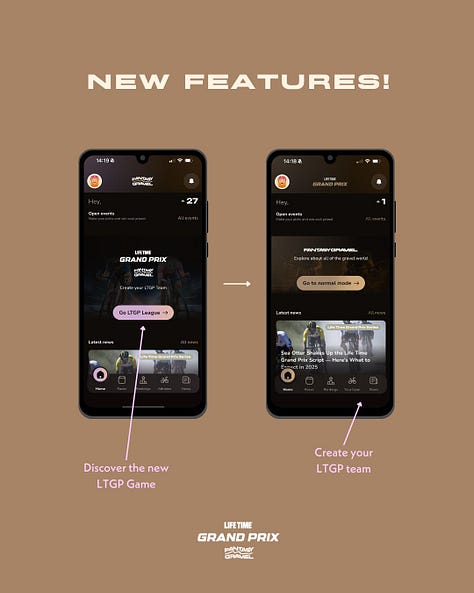Monday Break - Issue 134
Here is your weekly recap of all things sport, culture and everything in between. From data to depth, look at ways sport is being redefined.
It’s Unbound Week! 🚴♂️🔥



One of the biggest moments in the gravel calendar is here, and we’re heading to Emporia to be right in the middle of the action. Starting Wednesday, the Athletic Affair & Fantasy Gravel team will be on the ground capturing content, meeting with athletes, and working alongside our partner brands to bring the full Unbound experience to life.
And of course—it’s time to play.
On the Fantasy Gravel app, we’ve got not one, but two games waiting for you this week. First, our classic Hot Picks—where you can predict your race favorites and compete for the top spot on the leaderboard. Second, the Life Time Grand Prix team league—build your ultimate squad for the full LTGP season and lock in your picks ahead of Unbound. > Android / iOS
Let’s go make this an Unbound to remember.
Oura is shaking things up
While Apple and Whoop polish their platforms, Oura takes a different path. Its latest updates shift focus from sleep and recovery to real-time performance. Think heart rate, oxygen, and stress data right as you train. It is no longer just about recovery. The Finnish ring company wants to play offense too.
Djokovic and the long game
Novak Djokovic does not just win. He rewrites what greatness means. In a deep dive from Joe Pompliano, we see how Djokovic’s dominance comes from more than talent. It is consistency, discipline, and an almost uncomfortable obsession with improvement. No drama. Just legacy.
Strava: the $2B Workout
The Wall Street Journal reports that Strava is seeking to raise fresh capital at a $2 billion valuation. From humble ride logs to a full-blown fitness community, Strava is now positioning itself as a data company. The kind that knows when, where, and how millions move. Monetisation is no longer a question. It is the playbook.
HRV is the Key, According to Science
Forget pace and power. Science now says heart rate variability may be the most important metric for triathletes. A growing body of research argues that training with HRV leads to smarter adaptations, fewer injuries, and better long-term results. It is a physiological mirror. Not just how hard you go, but how ready you are.




